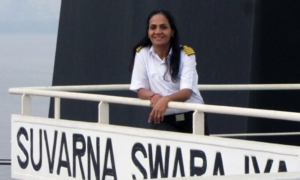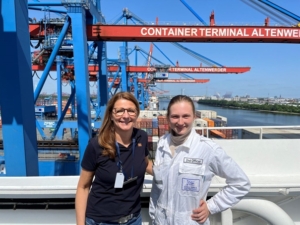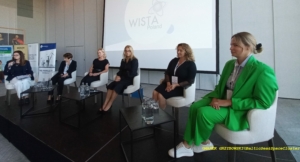The maritime business focuses on women. All Aboard Alliance supports ladies on ships
 Captain Master Mariner Radhika Menon
Captain Master Mariner Radhika Menon
 By Marek Grzybowski
By Marek Grzybowski
The Synergy Southern Reverence ship sailed from Singapore on October 30 this year. under the command of Captain Radhika Menon, the first woman to become a captain in the Indian Merchant Navy. This is how the Diversity@Sea project began.
Columbia Group aims to attract more women to maritime transport operations. Cyyprus-based Columbia Shipmanagement, a company that manages more than 400 ships, aims to ensure better gender balance in the industry with a new mentoring program. All Aboard Alliance has joined the development of maritime women’s staff on a large scale and announces an initiative for maritime integration.
According to a 2021 report by BIMCO and the International Chamber of Shipping, women make up just 1.2% of the 1.89 million seafarers worldwide.
Columbia states that “the industry lacks the use of women’s talent.” All Aboard Alliance is an initiative of the World Maritime Forum. 11 companies will carry out a series of activities under the slogan Diversity@Sea. Their goal is to improve life conditions at sea. The program applies to all seafarers, but has been developed to improve working conditions and culture on ships where women serve.
Therefore, the pilot program will be carried out on the Synergy Southern Reverence vessel. It is scheduled to sail from Singapore on October 30 under the command of Captain Radhika Menon, the first woman to become a captain in the Indian Merchant Navy.
 Columbia Group’s group director of sustainability, diversity and inclusion Claudia Paschkewitz with second officer Olena Kokorieva. | Photo: Pressefoto, Columbia Group
Columbia Group’s group director of sustainability, diversity and inclusion Claudia Paschkewitz with second officer Olena Kokorieva. | Photo: Pressefoto, Columbia Group
Lady Captain Master Mariner on board
There will be more ships because the following companies have joined the program: Bernhard Schulte Shipmanagement, BP, Cargill, Chevron Shipping, Diana Shipping, Dorian LPG, Gaslog, Hafnia, Stena, Synergy and Swire Shipping. As you can see, there are operators and companies managing specialized ships here. Each participating company has committed to meeting a number of minimum requirements on board one pilot vessel in the operator’s fleet. It is assumed that at least four women will be on board.
– Among the large number of seafarers in the industry, women constitute less than 2% – emphasizes the release of 11 operators participating in the All Aboard Alliance. On the ship, the operator will ensure appropriate conditions for menstrual needs, provide crew members with 24-hour Wi-Fi and ensure that all maritime personnel have access to personal protective equipment.
– We need to change the culture surrounding women in the industry and provide them with a more profitable career in the maritime industry so that we can attract and expand the pool of talent from which we draw [staff – MG] – said program leader Claudia Paszkiewicz, Columbia Group’s managing director of sustainability, diversity and inclusion.
The maritime industry lacks talented women
Recognizing that the industry is lacking many talented women, the Cypriot operator anticipates that the mentoring program will not only attract more women on board ships, but will help retain them in the industry after their internship. This is particularly hampered by a number of challenges associated with the seafaring profession, such as availability, long absences, working away from home and, in general, “the flexibility needed to reconcile work and family life”.
Limassol-based Columbia Group operates in the maritime business through a network of over 33 management offices, crewing agencies and training centers. The company employs over 16,000 people. people, mainly men. And the Cypriot company intends to change that.
Columbia took a comprehensive approach to creating culture on ships. It will use the services of OneCare Solutions (OCS), a provider of solutions in creating corporate culture. OCS will conduct training for program mentors, who will be senior colleagues working in various departments on land. Each will be trained in how to deal with situations such as sexual harassment and abuse, and will be assigned to one female cadet in the fleet for 12 months of sea duty.
Sexual harassment remains a widespread problem in shipping. The Danish government recently published a report which shows that every sixth of the 3,500 seafarers surveyed witnessed cases of abuse or sexual harassment on Danish ships during the 12-month research period – the Limassol company justifies its actions.
Low culture not only on board
A study by All Aboard Alliance published in April identified 15 key issues facing women at sea. The study is the first to contribute to broader activities within the Diversity@Sea project. One of its important goals is to explore how to make maritime careers more diverse, inclusive and attractive to a wider range of talented people, including women.
The 15 main issues are divided into four categories, the first of which is the difficulty of achieving professional success at sea for women. This is due to the fact that the male part perceives women as a group of less competent people than male colleagues.
 WISTA Poland meeting
WISTA Poland meeting
The ladies from WISTA POLAND also talked about it during the meeting on the occasion of the 30th anniversary of this organization in Poland. Therefore, in Poland we also have to face the lack of recognition of the potential of women in managerial positions in the maritime business and as officers and sailors on ships.
The All Aboard Alliance report notes “Lack of equal access to onboard training or assignments and the need to outperform those in similar positions to gain respect or advancement.” Another category identified is that social relationships on board can be particularly difficult for women at sea.
Improve social conditions necessary
Women also signal a sense of isolation or lack of support due to gender. The fear of gossip or hearsay is common. There is evidence of abuse of power, sexual harassment or sexual misconduct on board.
The last category refers to the social conditions on ships. Lack of access to female sanitary equipment on board or lack of access to properly fitted personal protective equipment (PPE) is common.
Most units do not have designated women’s changing rooms or bathrooms. This information was determined based on the analysis of interviews with 115 navies of all ranks and positions. The majority of respondents (59%) were women holding at least the first officer rank.
When asked about their preferred percentage of women on board, the sailors interviewed had very different preferences. Responses ranged from 10% to 75% and 1 to 10 women, respectively, while one in five respondents did not have a preferred gender ratio. Many of the women interviewed emphasized the importance of having female senior officers on board.
Not only on ships, women in the maritime business have to pave the way and often overcome stereotypes or simply hidden or open reluctance. In Poland, WISTA Poland works persistently to promote women in the maritime economy. Having observed the ladies’ meetings for many years, I can say that they do it with charm and great effectiveness.
